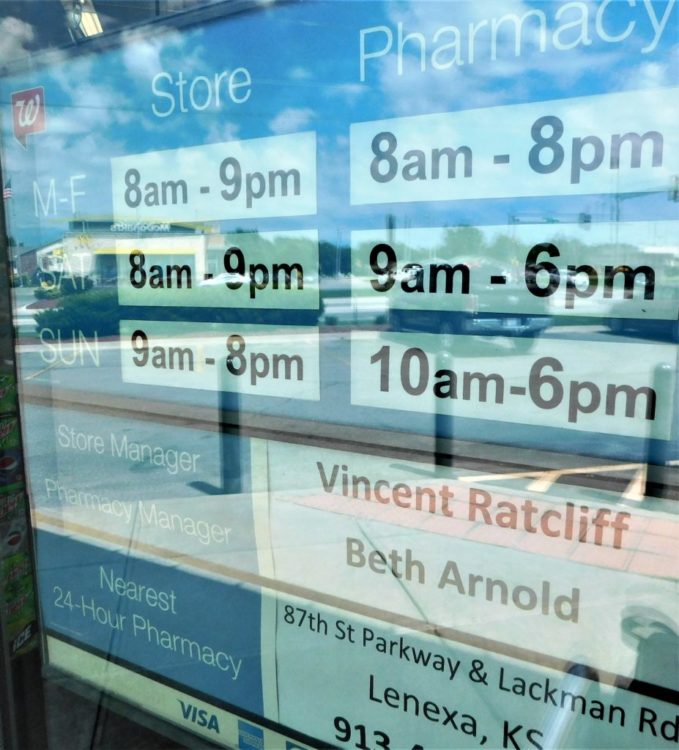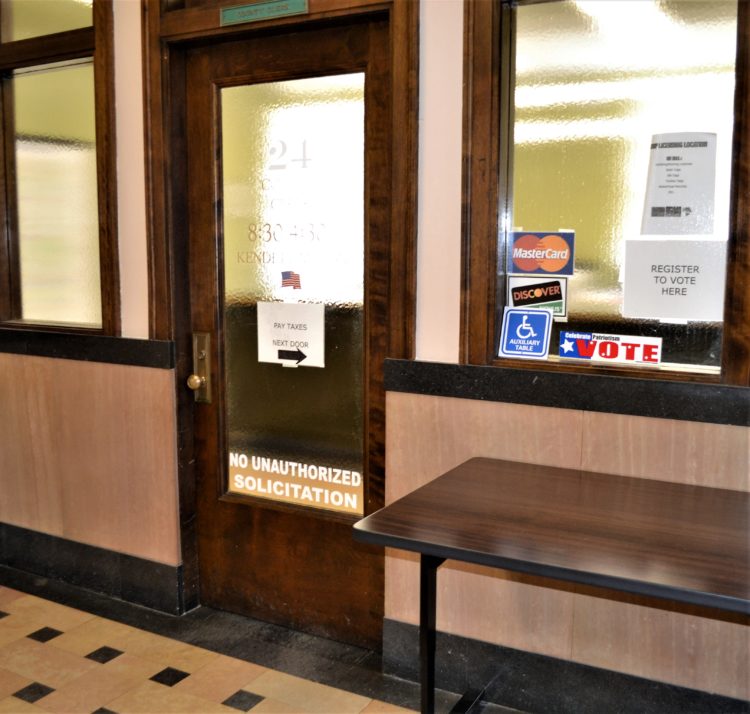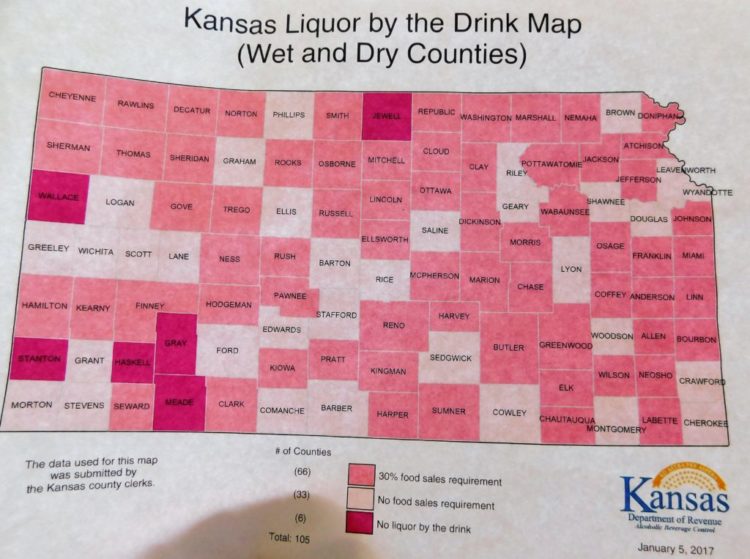The Bourbon County Sheriff’s Office daily reports can best be viewed on a computer.
The office can be reached at (620) 223-2380.

Bourbon County residents now have access to disposing of unwanted medications in Fort Scott during the local Walgreen Store hours.
This is thanks to a new partnership between Blue Cross and Blue Shield of Kansas and Walgreens.
“Having access to this kiosk (in Walgreen) is a great way for those living in Fort Scott to safely dispose of their unwanted, unused or expired medications — prescription or over-the-counter,” Mary Beth Chamber, Blue Cross/Blue Shield of Kansas Corporate Communications Manager said in a press release. ” Properly disposing of medications can lower the incidence of misuse, abuse and accidental poisonings. This is especially important as we face a growing opioid epidemic in Kansas.”
There is no cost for the disposal.
The kiosk in Walgreens Fort Scott is located in the northeast section of the store, near the pharmacy window.

Accepted items for the kiosk: prescriptions, inhalers, liquids, lotions, pet medications, prescription patches, over-the-counter ointments, creams, aerosol cans, medications, and vitamins.

Not accepted are hydrogen peroxide, illicit drugs, needles, and thermometers.
The store hours are 8 a.m. to 9 p.m. Monday through Saturday and 9 a.m. to 8 p.m. on Sunday.

In addition to Fort Scott Walgreen, the kiosks are available in Walgreen stores in the following communities: Derby, Dodge City, Hays, Hutchinson, Lawrence, Leavenworth, Manhattan, and Ottawa.
Since 2016 more than 270 tons of unwanted medications have been collected in the program, according to the press release.
Agenda
Bourbon County Commission Room
2nd Floor, County Courthouse
210 S. National Avenue
Fort Scott, KS 66701
Tuesdays starting at 9:00
Date: June 5, 2018
1st District-Lynne Oharah Minutes: Approved: ____________
2nd District-Jeff Fischer Corrected: _______________
3rd District-Nick Ruhl Adjourned at: _______________
County Clerk-Kendell Mason
9:00- 9:15 Jim Harris-2019 Road & Bridge Budget
9:15-9:30 Trash bids
9:45-10:00 Rhonda Cole-2019 District Court Budget
10:00-10:30 Bill Martin- Jail Sales tax
10:45-11:00 Firework Permits
11:00-11:07 Justin Meeks- Executive Session privileged in the attorney-client relationship
11:07-11:12 Justin Meeks- Executive Session confidential data relating to financial affairs or
Trade secrets of corporations, partnerships, trust & individual proprietorships
11:12-11:15 Justin Meeks- Business accelerator
11:15-11:20 Justin Meeks- Sale of County Property
11:20-11:25 Justin Meeks – Update on NRP
11:25-11:28 Justin Meeks – County Counselors Association of Kansas
11:28-11:33 Justin Meeks- Old Jail/Data Center Trip
11:33-11:48 Cassie Laemmli- Wall Street Insurance
12:00- 1:30 Commissioners gone to Lunch
1:30- 2:00 Pat Curnow- P1 Group
2:00-2:15 2019 Bourbon Co. Soil Conservation Dist. Budget
2:30-2:45 2019 Tri-Valley Budget
3:00-3:15 Will Wallis- 2019 Emergency Management Budget
Justifications for Executive Session:
Personnel matters of individual non-elected personnel
Consultation with an attorney for the body or agency which would be deemed privileged in the attorney-client relationship
Matters relating to employer-employee negotiations whether or not in consultation with the representative(s) of the body or agency
Confidential data relating to financial affairs or trade secrets of corporations, partnerships, trusts and individual proprietorships
Preliminary discussions relating to the acquisition of real property
Matters relating to the security of a public body or agency, public building or facility or the information system of a public body or agency, if the discussion of such matters at an open meeting would jeopardize the security of such public body, agency, building, facility or information system

Bagworms are a yearly pest in our area and can cause considerable damage. Most homeowners typically don’t get too concerned about bagworm control until they see large bags present on plants. By then it is too late and the damage is already done! I actually found newly hatched bagworms on my Bald Cypress trees over the weekend.
Bagworms overwinter as eggs deposited in the female bags. From mid-May through mid-June, larvae hatch from the eggs and exit from the bottom opening of the old bag. Larvae begin constructing their miniature silk-lined bags immediately. Only after the bags have been completed do the larvae begin actual feeding activities. And as the larvae grow, so do their bags. By mid-to late August when feeding activities are complete, larvae firmly anchor their bags to the twigs and branches on which they were feeding.
Bagworms are most commonly found on eastern red cedar and junipers. However, bagworms can attack arborvitae, spruce and pine. Broadleaf trees, shrubs and ornamentals can also serve as a host to bagworms. After bagworms have defoliated a host plant, they are capable of migrating in search of additional food sources. They may attack the same species from which they came or a completely different species.
The damage caused by bagworm feeding can be minimal to severe. As larvae enter their later development stages, they require greater amounts of food. Sometimes in what seems to be just overnight, bagworms can completely defoliate a tree. Several successive years of heavy foliar feeding can result in the death a tree, especially with conifers.
There are two ways to control bagworms – cultural and chemical. Cultural practice is used by those who do not want to utilize insecticidal sprays to control bagworms. Instead, bagworms are eliminated by handpicking individual bags from plants. This is best done in the winter months when bags stand out against a trees background color. Keep in mind that a single missed bag could result in a thousand new bagworm larvae. Of course handpicking becomes impractical when a host is literally covered with bags or it is too tall to make handpicking possible.
Chemical control is most effective when larvae are in their early developmental stages. Generally, bagworm larvae will begin emerging from the overwintering bag by mid-to late May. Hatching does not happen overnight. Instead, hatching can continue for 4 to 5 weeks. Controls applied in late summer are often a waste of time and expense because the larvae are large, tough and may have stopped feeding. Now is the time to find the correct insecticide and get the sprayers out and ready for the job ahead.
For more information on bagworm control, please contact me at one of our three Southwind Extension District office locations.
Krista Harding is a K-State Research and Extension Agricultural agent assigned to Southwind District. She may be reached at [email protected] or 620-244-3826.
K-State Research and Extension is an equal opportunity provider and employer.

Communities in Bourbon County have taken advantage of the government’s opportunities to feed children and youth for free this summer.
Fort Scott
The Kansas Food Bank Federal Summer Meal Program provides free shelf-stable food for area youngsters up to 18 years old at the Keyhole Youth Center, 1002 S. Main, across from Fort Scott High School.
The program started May 29 and serves lunch from noon to 1 p.m. and will continue until July 29.



Community groups volunteer their time to help serve the meals: Mondays the First Methodist Church serves, Tuesday-Fort Scott Church of the Nazarene, Wednesday-Pioneer Kiwanis, Thursday-City of Fort Scott, Friday-First Presbyterian Church and Community Christian Church.
On May 29, the first day of the food program there were 28 children who were served, according to Bethany Hartford, Keyhole director.
Hartford coordinates the meal program with Dona Bauer.
Uniontown
Uniontown’s Food Service Director Michelle DeMott is facilitating the Summer Food Service Program for USD 235. It is sponsored by the U.S. Department of Agriculture.
The food is free to children birth to 18 years old, DeMott said.
“It is no cost, regardless of any financial standard,” she said.
Their program offers cooked breakfasts and lunches Monday through Friday and starts next Monday, June 4.
Breakfast is from 8:30 to 9 a.m. and includes such menu items as biscuits and gravy, breakfast pizza, waffles, cereals, donuts, cheese, and yogurt, plus milk and juice. Each day features a different menu.
Lunch is from 11:45 a.m. to 12:15 p.m. and includes the standard American diet offerings of hot dogs, spaghetti, tacos, hamburgers, and sandwiches.
The school has a summer school program, of which the food service is a part. But other children in the community may come for the food at breakfast and lunch, she said.
Additionally, the Uniontown High School weight-lift program and the volleyball practice students come to the meals, DeMott said.
The meals are provided at West Bourbon Elementary School, located at 602 Fifth Street.
Bronson and Redfield
Bronson and Redfield communities will also have meals available at the same time at the Bronson Community Center, 503 Clay, and the Marmaton Community Church, 102 Cedar in Redfield.
“We will have activities for the kids between breakfast and lunch at these sites,” DeMott said. “For those who would like to stay”
Community members volunteer to facilitate activities for the youth in these communities, she said.
“Some had parents not at home and who didn’t want to go home,” DeMott said.

At noon, Friday, June 1 is the filing deadline for candidates interested in serving as a candidate in the upcoming primary election.
Additionally, no switching of political parties is allowed for a period of time starting tomorrow, June 1.
A law passed in 2014 by the Kansas Legislature prohibits Republican and Democratic party members from switching parties during the period of June 1 (at noon) through the August primary (following certification of election results), according to a public election notice posted by Bourbon County Clerk Kendell Mason.
” You can’t switch from a Republican to a Democrat or vice versa after noon June 1st,” Mason said. “If someone wants to switch parties they need to do this before noon on June 1st or wait until after the August primary.”
A registered voter who is not affiliated with either the Democrats or Republicans may choose to align with either party at three times: during this period, or when requesting an advance ballot through the Bourbon County Clerk’s Office or when voting at their polling site during the primary election, according to the public notice.
” An unaffiliated voter can affiliate at any point including on election day, but they will need to fill out a new voter registration card to affiliate,” Mason said. “They will remain the party they affiliated with until they fill out a new voter registration card.”
The primary election is August 7, 2018.
For more information: 620-223-3800.

Boiler Room Brewhaus is expanding. The microbrewery is moving from 102 S. National Avenue to 10 S. National Avenue, the historic Downtowner Hotel.
“We ran out of space,” Ritter said. “Bryan (her husband and the brewer for the business)…didn’t have enough space. (He) couldn’t make it in advance to not run out.”

There are additional advantages to the location at the corner of National Avenue and Wall Street, “Two of the busiest streets in Fort Scott,” she said.
“It’s all on one level, more patrons will have easier access, it has handicapped accessible restrooms, visibility is pretty significant and there is a lot more room for cold storage, like a bigger refrigerator. We will now have a refrigerated room to put kegs in…trucks can come up to deliver grain, and more storage,” Ritter said.


“We’ll be able to make more of our own stuff,” she said. “We’ll have the ability to serve from four more taps. Although, it will take us a while to catch up, because of the move.”
Future plans also include an outside patio area for customers, under the carport on the south portion of the building.

The Ritters, she and her sister-in-law Peggy Ritters are the owners, will have a “soft” opening at the new location Friday, June 1 at 4 p.m. “to celebrate with people and say thanks for all your help and support,” she said.
Ritter also wanted to thank Bobby and Denise Duncan for letting them start their business in their building, Ritter said.
Josh Jones, the owner of the Downtowner building has been repairing and updating the new site for them.
“He’s done all the painting, replaced glass, changed locks, plumbing and took up all the carpet and sanded the floor,” Ritter said.

Saturday, June 2 is the public ribbon cutting at 1:45 p.m. just before they open at 2.
Hours for the microbrewery remain Thursday-Friday from 4-10 p.m.
Saturdays from 2 to 10 p.m. and Sundays from 2 to 7 p.m.
Contact them at 620-644-5032.

The Ritters lobbied for a change in local law, so they won’t have to have 30 percent of their profit in food sales at the microbrewery.

As of January 2017, 66 counties (shaded in medium pink above) in Kansas require there be 30 percent of profits in food sales on the premises to be able to sell liquor, 33 (light pink) counties don’t have that requirement and six counties (dark pink) are “dry” counties, and have no liquor by the drink.
Currently, Bourbon County requires 30 percent food sales in a business that sells liquor.
“It has been approved to put it on the November 2018 ballot to say you do not need to have 30 percent food sales to sell alcohol,” Ritter said.